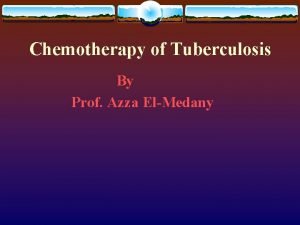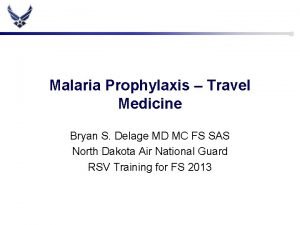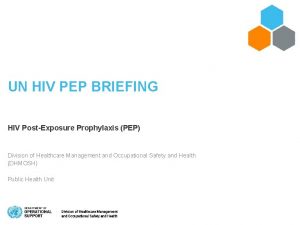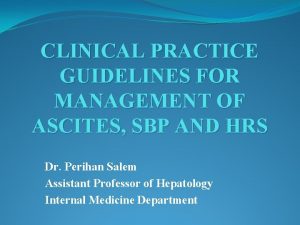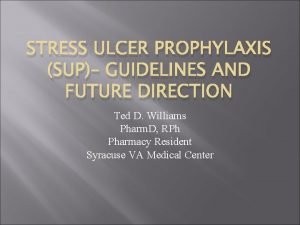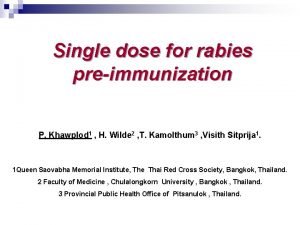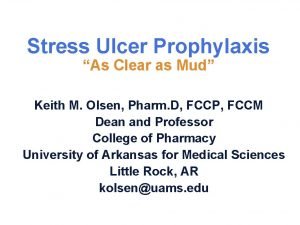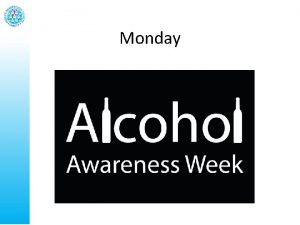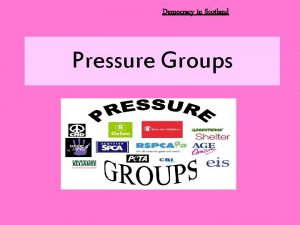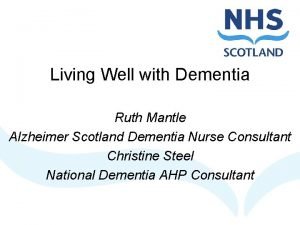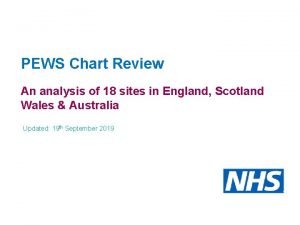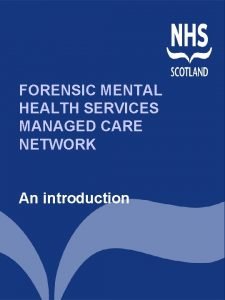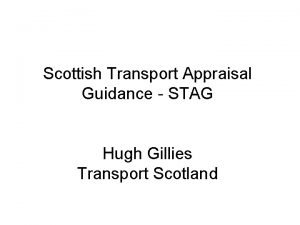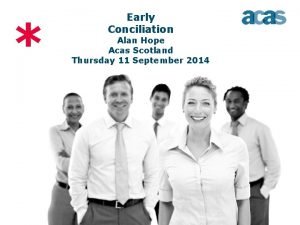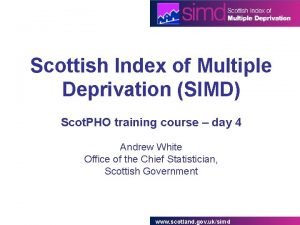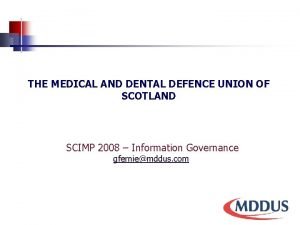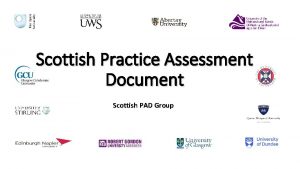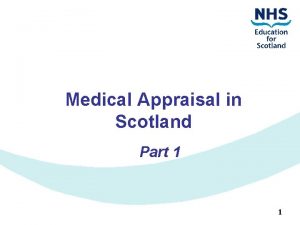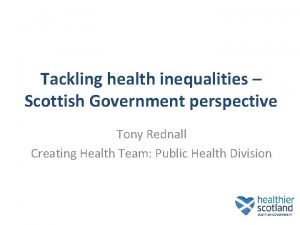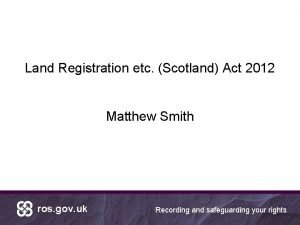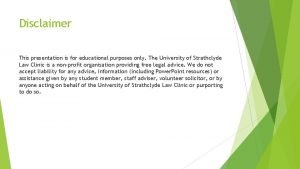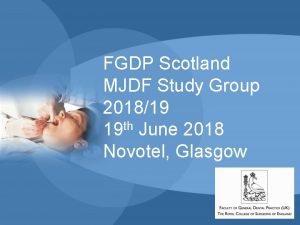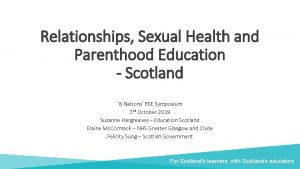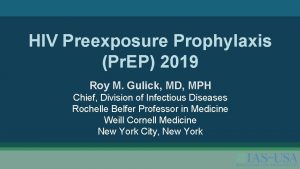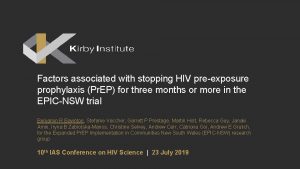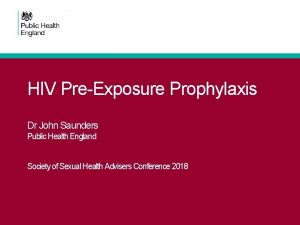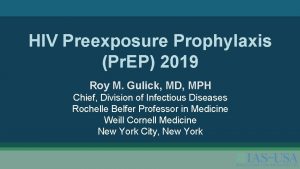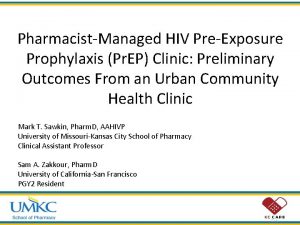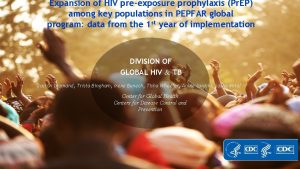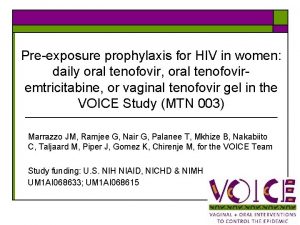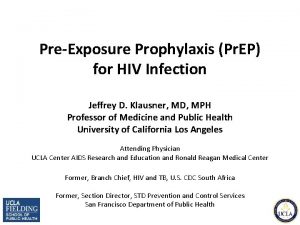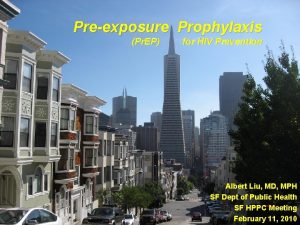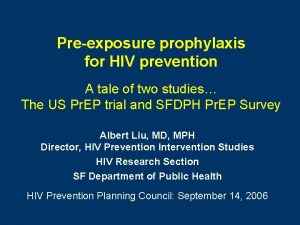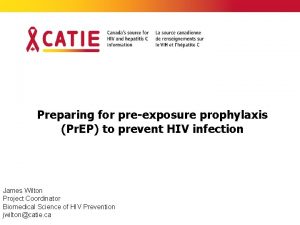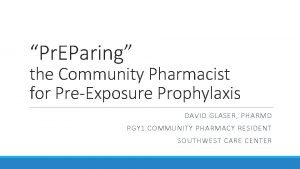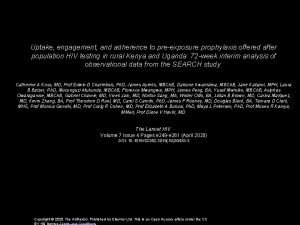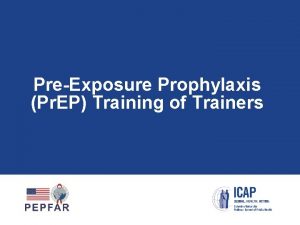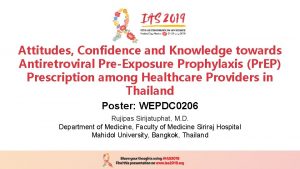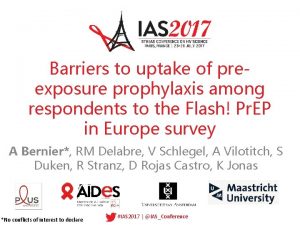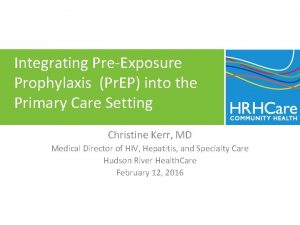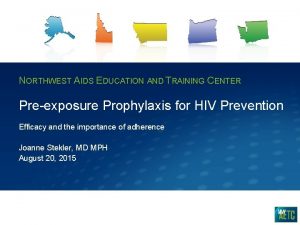HIV PreExposure Prophylaxis HIV Pr EP in Scotland


















































- Slides: 50

HIV Pre-Exposure Prophylaxis (HIV Pr. EP) in Scotland An update for registered practitioners January 2020

NHS Education for Scotland Key Messages • HIV is a major public health challenge for Scotland with an annual average of 349 new cases in Scotland over the last 5 years • Majority of HIV infections are sexually transmitted, with MSM* remaining the group at highest risk in Scotland • Pr. EP is an effective HIV prevention intervention which uses anti-retroviral drugs to protect individuals at highest risk from acquiring HIV • Studies conducted within the UK and international settings have found oral HIV Pr. EP to be effective in reducing sexual HIV transmission. These studies are mostly in MSM but there is also evidence of its effectiveness in heterosexual men and women with further studies planned in transgender men and women. • The medication currently recommended for HIV Pr. EP is a single fixed dose oral combination tablet. The combination tablet comprises of two antiretroviral drugs; Tenofovir and Emtricitabine.

NHS Education for Scotland Key Messages • Since July 2017, NHS Scotland has offered HIV Pr. EP through specialist sexual health services to individuals who meet eligibility criteria as part of a wider targeted national prevention programme • HIV Pr. EP should not be seen as a replacement for condoms. Regular testing for HIV and other sexually transmitted infections (STIs) is essential • Effective and consistent provision of advice and clinical care (including monitoring) is essential for the successful implementation of the HIV Pr. EP programme in Scotland • Pr. EP has renal and bone density side effects. In studies both these risks were partially reversible, however there may be a particular risk for loss of bone density in young adults/adolescents who have not attained peak bone mass

NHS Education for Scotland Role of registered practitioners • Registered practitioners have a key role in supporting the introduction of the HIV Pr. EP programme in NHS Scotland • This role includes the effective and consistent provision of advice and clinical care (including monitoring)

NHS Education for Scotland Aims of the resource • To raise awareness of the current epidemiology of HIV in Scotland the important role of Pr. EP in reducing the risk of HIV transmission • To provide registered healthcare practitioners with an overview of the HIV Pr. EP programme delivered by specialist sexual health services in Scotland, including eligibility • To support registered practitioners involved in discussing and/or offering HIV Pr. EP to individuals in Scotland • To highlight clinical aspects of the safe provision and monitoring of HIV Pr. EP medication

NHS Education for Scotland Learning outcomes After completing the resource practitioners will be able to: • Describe the current epidemiology of HIV in Scotland • Outline the rationale and evidence base for a targeted HIV Pr. EP programme in Scotland their role in delivering it • Discuss with clients the benefits and clinical considerations associated with HIV Pr. EP • Define clinical aspects of the safe provision and monitoring of the HIV Pr. EP medication • Identify sources of additional information

NHS Education for Scotland Contents • Why was HIV Pr. EP introduced in Scotland? • What is the evidence base for HIV Pr. EP? • HIV Pr. EP eligibility in NHS Scotland • HIV Pr. EP Current Medication • Resources

NHS Education for Scotland Why was HIV Pr. EP introduced Scotland?

NHS Education for Scotland HIV in Scotland • Every year in Scotland new HIV diagnoses continue to be made with an average of 349 new diagnoses each year in the last 5 years • The majority of infections are sexually transmitted • Since 2014, MSM have accounted for 50% of all new HIV diagnoses compared to 34% for heterosexuals • Since 2015, data indicate that a higher proportion of new diagnoses in MSM are as a result of recent (less than 3 -4 months) infections (29%) compared with other risk groups (18%) • MSM remain the group at highest risk of HIV in Scotland

NHS Education for Scotland HIV reports by transmission category, Scotland, 20092018 450 400 Number of diagnoses 350 300 MSM 250 Heterosexual PWID 200 Other/Unk 150 Total 100 50 0 2009 2010 2011 2012 2013 Year 2014 2015 2016 2017 2018

NHS Education for Scotland What is HIV Pr. EP? • Pr. EP stands for ‘pre exposure prophylaxis’ • Pr. EP is considered an effective HIV prevention intervention • Pr. EP is used by HIV negative people to prevent them from becoming HIV positive • Anti-retroviral drugs are taken before potential exposure to HIV to reduce the risk of the virus establishing itself in the body • Pr. EP forms one component of wider targeted HIV prevention for those at highest risk of HIV acquisition in Scotland

NHS Education for Scotland What is HIV Pr. EP? (contd. ) • HIV infection occurs over a short time. Even if sex lasted a few minutes, it takes about 30 minutes after sexual exposure for the virus to get through genital skin and enter the body • It then takes 2 -3 days for the infection to become established in the body • For HIV Pr. EP to be most effective the medicine needs to be at protective levels throughout this period • HIV Pr. EP needs to be taken before sex and for several days afterwards

NHS Education for Scotland What is HIV Pr. EP (contd. )? • Medication currently recommended for HIV Pr. EP interventions is a single fixed dose oral combination tablet • HIV Pr. EP currently comprises of two antiretroviral drugs Tenofovir and Emtricitabine

NHS Education for Scotland HIV Pr. EP Part of a National Intervention Programme • HIV Pr. EP is part of a wider targeted national prevention programme delivered by the NHS in sexual health services • HIV Pr. EP should not be seen as a replacement for condoms, and regular testing for HIV and other STIs is crucial

NHS Education for Scotland Pr. EP is part of the wider HIV prevention strategy Additional strategies include • Regular HIV testing • Treatment for people living with HIV to achieve U=U* • PEPSE** • Behaviour change interventions • Condoms

NHS Education for Scotland What is the evidence for HIV Pr. EP?

NHS Education for Scotland HIV Pr. EP evidence • • PROUD Study The study was carried out in 13 sexual health clinics in England More than 500 MSM and/or transgender women were enrolled One group took daily Pr. EP as soon as they enrolled on the study (intervention group) One group took Pr. EP after a year (deferred group)

NHS Education for Scotland PROUD study results • In October, 2014, PROUD reported that Pr. EP dramatically reduced the risk of HIV infection by 86% • Nearly all of the HIV infections occurred in people in the deferred Pr. EP group • Of the few infections that occurred in the Pr. EP intervention group most were in people who were not actually taking Pr. EP

NHS Education for Scotland HIV Pr. EP evidence IPERGAY study –France and Canada • This study reported a 86% reduction in a similarly high risk group of gay men and transgender women • IPERGAY used ‘event based’* dosing rather than daily Pr. EP

NHS Education for Scotland

NHS Education for Scotland

NHS Education for Scotland Summary- Why was HIV Pr. EP introduced in Scotland? • Clinical trials show at least 86% reduction in HIV sexual transmission among MSM using Pr. EP (PROUD and IPERGAY studies) • Randomised Controlled Trials in heterosexuals have shown a 77% (TDF 2 study) and 73% (Partners in Pr. EP) reduction in HIV transmission. The reduced efficacy in heterosexuals is thought to be due to lower drug levels in females and is under review with further research

NHS Education for Scotland HIV Pr. EP eligibility in NHS Scotland

NHS Education for Scotland HIV Pr. EP in NHS Scotland • HIV Pr. EP has been SMC* approved and needs to be implemented in the same way as other effective new interventions, including review of current practice and priorities • In consultation with stakeholders, it was made available through specialist sexual health services in July 2017 • HIV Pr. EP needs to reach individuals at the highest risk of acquiring HIV infection sexually to be effective • Practitioners should liaise with sexual health teams in their board area to confirm local arrangements

NHS Education for Scotland HIV Pr. EP- Universal Criteria • Aged 16 or over • Tested HIV negative • Able to attend the clinic for regular 3 monthly review including for monitoring, sexual health care and support and to collect prescriptions • Willing to stop NHS funded Pr. EP if the eligibility criteria no longer apply • Resident in Scotland

NHS Education for Scotland Eligibility criteria • Current sexual health partners, irrespective of gender, of people who are living with HIV and with a detectable viral load • MSM and transgender women with a documented bacterial rectal STI in the last 12 months • MSM and transgender women reporting condomless penetrative anal sex with two or more partners in the last 12 months, and likely to do so again in the next three months • Individuals, irrespective of gender, at equivalent high risk of HIV acquisition, as agreed with another specialist clinician

NHS Education for Scotland HIV Pr. EP- Not eligible • Already living with HIV or suspected HIV seroconversion • Monogamous serodiscordant couples where the partner living with HIV is on treatment and has undetectable viral load • Pre-existing medical conditions (such as renal impairment) that significantly increase the risk of TDF/FTC adverse events • Individuals chronically infected with hepatitis B virus where TDF/FTC may be used for therapy can still use HIV Pr. EP but should use daily dosing and care should be in coordination with the local hepatology team. These patients should also be advised not to stop HIV Pr. EP without medical advice.

NHS Education for Scotland HIV Pr. EP –Current medication

NHS Education for Scotland Current medication • Brand name for a fixed dose co-formulation of Ø Tenofovir Ø Emtricitabine • Licensed for treatment of HIV • As part of combination therapy • Widely used off-licence in PEPSE* • Generic versions available with alternative tenofovir salt

NHS Education for Scotland HIV Pr. EP –side effects • Majority of people do not report side effects Potential side effects • Nausea, diarrhoea, bloating and headache can happen in about 1 in 10 people in the first months but usually resolve after four weeks • Pr. EP can affect kidney function and bone density, renal monitoring is important • ‘Event based’ Pr. EP might reduce the risk of side effects as less drug exposure though this has not been formally studied yet

NHS Education for Scotland HIV Pr. EP-side effects (contd. ) Kidney function • • • A small proportion of people taking Pr. EP have developed reduced kidney function Changes to kidney function reversed when stopping Pr. EP Risk is higher in older adults and/or risk factors for renal disease such as nephrotoxic drugs or family history Bone density • • Pr. EP can reduce bone density by 1 -5 % In studies this was partially reversible, however there may be a particular risk in young adults/adolescents who have not attained peak bone mass* Risk is also higher in those who already have low bone density related to other factors To date, there have been no reports of bone fractures relating to Pr. EP use

NHS Education for Scotland How is Pr. EP taken? Trials have shown that Pr. EP can be taken in two ways: 1. Daily Dose 2. Event based

NHS Education for Scotland 1. Daily Pr. EP: protection 24/7 • Most Pr. EP studies have used daily Pr. EP • Taking Pr. EP every day helps ensure there are protective drug levels 24 hours a day, 7 days a week • For people who routinely have sex more than once a week daily Pr. EP is likely to be a better dosing option

NHS Education for Scotland 1. Daily Pr. EP: protection 24/7 cont’d • Current evidence suggests that for daily dosing in MSM a double dose should be taken between 2 and 24 hours prior to sexual intercourse and a single dose each day thereafter • For heterosexual cis men and women and transgender men and women, 7 days of single doses is currently advised prior to sex and a single daily dose thereafter • If stopping Pr. EP, MSM need to take a single dose every 24 hrs until 48 hrs after their last sexual encounter while heterosexual men and women and transgender men and women need to continue taking a single daily dose of Pr. EP for 7 days

NHS Education for Scotland 2. Event based dosing (also called on • Only advised for MSM demand) • Advised when an individual is at risk of infection less frequently for example once per month, or does not want to take a tablet each day • If taken this way care must be taken regarding timing of doses to maximise the efficacy of Pr. EP in preventing HIV infection • Taking Pr. EP before and after a risk is still very effective • The ‘before’ sex dose is important to ensure that appropriate drug levels are present before exposure

NHS Education for Scotland Pr. EP dosing options, MSM Only

NHS Education for Scotland Event based dosing (EBD) MSM only Event based dosing involves: • Taking a double dose of Pr. EP (two pills) between 2 and 24 hours before sex • After initial double dose, take single dose every 24 hours until 48 hours after last sexual encounter Individuals should aim to have a single pill each day until two days after the last episode of sex

NHS Education for Scotland Pr. EP and drug resistance • If a person becomes HIV positive while taking Pr. EP, there is a small risk of developing drug resistance. This means that the medications used for Pr. EP may not work as well to treat HIV, if required • In Pr. EP studies, very few people became HIV positive whilst taking Pr. EP, and of these 1 in 20 developed drug resistance which is lower than overall rate of HIV resistance in the UK (7. 5% in 2015) • Highest risk of drug resistance is if individuals start Pr. EP when they already have HIV or if they stop Pr. EP and their HIV status is not checked prior to restarting

NHS Education for Scotland Pr. EP and other STIs • Pr. EP will not protect against other STIs and condoms are still advised for prevention of these infections • Generally, STIs are manageable but can sometimes cause unpleasant symptoms, some of which can be serious, as well as increased antibiotic resistance • Regular checks for STIs when taking Pr. EP is important, as is the use of condoms

NHS Education for Scotland Does Pr. EP interact with any other medications? • Tenofovir and Emtricitabine do not interact with many other medicines but should be used with caution with other drugs that have renal toxicity Tenofovir and non steroid anti-inflammatory drugs • One important interaction is between Tenofovir and non-steroid anti-inflammatory drugs, especially diclofenac. Together they can cause kidney problems • Other medicines from this class include ibuprofen and naproxen • Advise patients to avoid using these medicines while taking Pr. EP • Further information can be found at the HIV Drug Interaction Checker* Recreational drugs • Pr. EP does not react with other recreational drugs but if these affect kidney function they should not be taken at the same time as Pr. EP Creatine • Some clinicians have noted a raised creatinine among patients who use creatine drinks

NHS Education for Scotland Before starting Pr. EP • Ensure an individual has a HIV test before starting Pr. EP • Pr. EP cannot be used if someone is already living with HIV • A 4 th generation* HIV blood test should be used as it indicates HIV status 4 weeks ago • Some near patient tests are 3 rd generation** and indicate HIV status 3 months ago. This should be repeated out with the window period or a 4 th generation test be used prior to Pr. EP if there have been interim risks. • Risk assessment and patient discussion should be used to decide whether a patient who is still in the window period for HIV testing should start Pr. EP

NHS Education for Scotland Before starting Pr. EP (contd. ) • Pr. EP should not be started if a person has flu like symptoms and a recent HIV risk in order to rule out recent seroconversion • Kidney function should be checked via a blood test for creatinine prior to starting Pr. EP • Urinalysis should be performed

NHS Education for Scotland Before starting Pr. EP (contd. ) • Check for other sexually transmitted infections • Test for hepatitis B and recommend vaccination, or boost a previous vaccine as appropriate • Hepatitis B positive individuals can still use Pr. EP but should use daily dosing and in coordination with hepatology • Hepatitis C testing is recommended at baseline

NHS Education for Scotland Routine monitoring Registered practitioners should advise clients of the importance of regular review: Every 3 months at the sexual health clinic • HIV test- 4 th generation or antigen/antibody HIV blood test • Sexual health screen • Consider urine dipstick for protein; blood test for creatinine if >40 years, EGFR <90 or other risks for renal disease Every 12 months • Blood test for creatinine if EGFR >90 and age <40 • This may be performed more frequently and at least 6 monthly if other risk factors for renal disease • Test for Hepatitis B testing (as per local Health Board), and Hepatitis C

NHS Education for Scotland Other considerations • • • Practitioners should discuss any concerns individuals may have in relation to taking Pr. EP including: Eligibility Adherence Any new health issues including symptoms of sero conversion such as: sore throat; myalgia; flu like symptoms; and rash New medications and interactions Recreational drugs Relationship issues including pressures from others to take Pr. EP

NHS Education for Scotland

NHS Education for Scotland Key Messages • • • HIV is a major public health challenge for Scotland with an annual average of 349 new cases in Scotland over the last 5 years Majority of HIV infections are sexually transmitted, with MSM* remaining the group at highest risk in Scotland Pr. EP is an effective HIV prevention intervention which uses antiretroviral drugs to protect individuals at highest risk from acquiring HIV Studies conducted within the UK and international settings have found oral HIV Pr. EP to be effective in reducing sexual HIV transmission. These studies are mostly in MSM but there is also evidence of its use in heterosexual men and women The medication currently recommended for HIV Pr. EP is a single fixed dose oral combination tablet. The combination tablet comprises of two antiretroviral drugs; Tenofovir and Emtricitabine

NHS Education for Scotland Key Messages • Since July 2017, NHS Scotland has offered HIV Pr. EP through specialist sexual health services to individuals who meet eligibility criteria as part of a wider targeted national prevention programme • HIV Pr. EP should not be seen as a replacement for condoms. Regular testing for HIV and other sexually transmitted infections (STIs) is essential • Effective and consistent provision of advice and clinical care (including monitoring) is essential for the successful implementation of the HIV Pr. EP programme in Scotland • Pr. EP has renal and bone density side effects. In studies both these risks were reversible, however there may be a particular risk for loss of bone density in young adults/adolescents who have not attained peak bone mass

NHS Education for Scotland Resources • • Implementation of HIV Pr. EP: Second year report BHIVA/BASHH statement on Pr. EP HIV Scotland Terence Higgins Trust Other useful sites • www. prep. scot • Sexual Health and Wellbeing for gay and bisexual men • Waverley Care

 Anti rabies vaccine dose schedule in india
Anti rabies vaccine dose schedule in india Git prophylaxis
Git prophylaxis Malaria prophylaxis
Malaria prophylaxis Rabies virus ppt
Rabies virus ppt Pep kit contents
Pep kit contents Sbp treatment guidelines
Sbp treatment guidelines Stress ulcer prophylaxis criteria
Stress ulcer prophylaxis criteria Rabies vaccine dose
Rabies vaccine dose H2ra vs ppi
H2ra vs ppi Neisseria meningitidis prophylaxis
Neisseria meningitidis prophylaxis Macbeth king of scotland
Macbeth king of scotland Poppers scotland
Poppers scotland Pressure groups in scotland
Pressure groups in scotland Riddle animals
Riddle animals Asbo scotland
Asbo scotland Scotland electricity demand
Scotland electricity demand Living well with dementia scotland
Living well with dementia scotland Angles in scotland
Angles in scotland Pews chart
Pews chart Scotland campus dorms
Scotland campus dorms Learning link scotland
Learning link scotland Forensic network scotland
Forensic network scotland Gillian hamilton education scotland
Gillian hamilton education scotland 25 january scotland
25 january scotland He stood in his shoes and wondered
He stood in his shoes and wondered View of scotland/love poem
View of scotland/love poem Scottish transport appraisal guidance
Scottish transport appraisal guidance Acas scotland
Acas scotland Macbeth map
Macbeth map Simd scotland postcode lookup
Simd scotland postcode lookup Where is scotland
Where is scotland Traditional scottish christmas dinner
Traditional scottish christmas dinner The medical and dental defence union of scotland
The medical and dental defence union of scotland England and scotland both produce scones and sweaters
England and scotland both produce scones and sweaters Scottish practice assessment document
Scottish practice assessment document Medical appraisal scotland
Medical appraisal scotland Italian immigration to scotland
Italian immigration to scotland Theresa spence scotland.
Theresa spence scotland. Equally well scotland
Equally well scotland Land registration act 2012
Land registration act 2012 We spend our holiday in scotland last year
We spend our holiday in scotland last year Master of james iv of scotland
Master of james iv of scotland Educational disclaimer
Educational disclaimer Major cities in scotland map
Major cities in scotland map Professional values in teaching scotland
Professional values in teaching scotland Registers of scotland customer services
Registers of scotland customer services Fgdp scotland
Fgdp scotland Sexual health and relationships education scotland
Sexual health and relationships education scotland Education scotland play pedagogy toolkit
Education scotland play pedagogy toolkit Youth link scotland
Youth link scotland Scotland introduction
Scotland introduction

